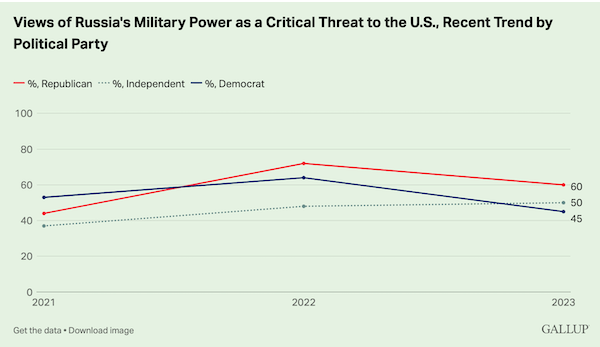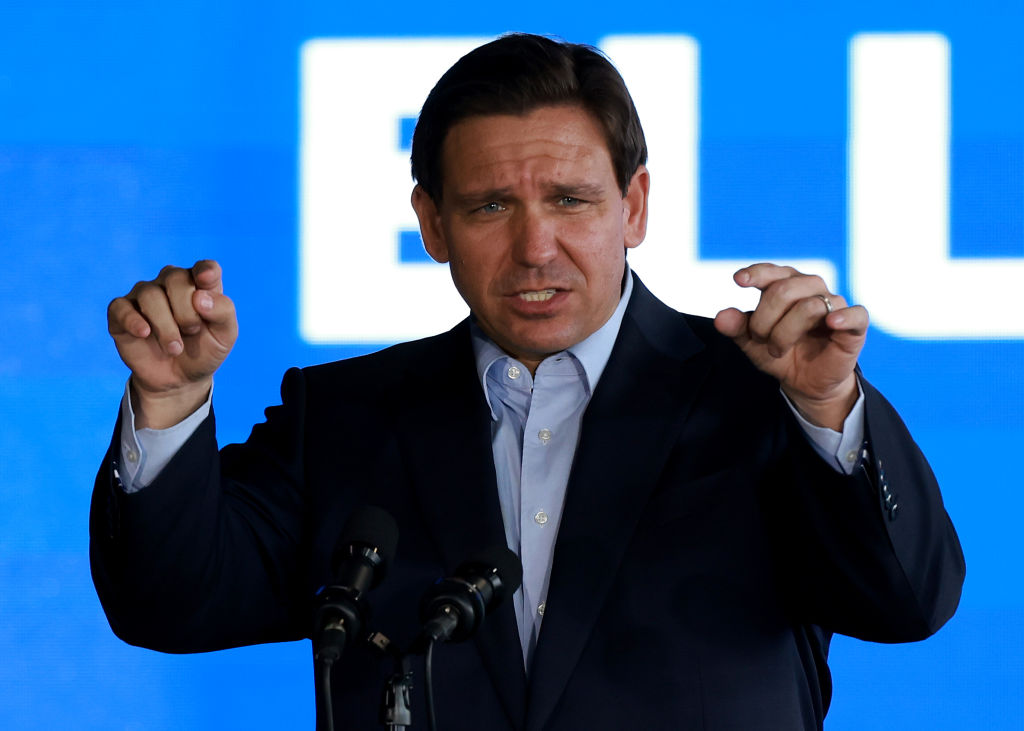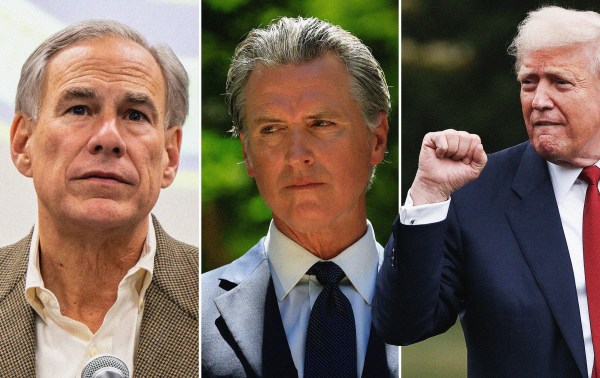What would you get if you asked ChatGPT to craft a Ukraine policy optimized to pander to Tucker Carlson viewers rather than to maximize American interests?
This. You’d get this.
Even if we didn’t know already that Ron DeSantis was moving toward the Trumpist position on Ukraine, there was never a doubt he’d end up there. He concluded at some point during the last three years that his path to victory in a national primary requires never giving Trump an opening to call him an establishmentarian. (He can’t do anything about his pre-Trump record, unfortunately.) To court voters in the MAGA base and convince them that he’s “Trump but electable,” he resolved to chase every shiny populist object he sees.
He wasn’t about to ditch that strategy on the topic of Ukrainian sovereignty for something as meager as principle. Whether DeSantis even has political principles as you and I understand them is an open question, frankly. In 2015 he said, “We in the Congress have been urging the president, I’ve been, to provide arms to Ukraine. They want to fight their good fight. They’re not asking us to fight it for them. And the president has steadfastly refused. And I think that that’s a mistake.” Did he think it was a mistake because he believed containing Russia was an important U.S. interest? Or did he think it was a mistake because advancing in Republican politics necessitated wanting the opposite of whatever Barack Obama wanted?
DeSantis’ entire career might profitably be understood as a ChatGPT response to populist inputs. In 2012, when grassroots right-wingers were spoiling for entitlement reform, ChatRON spat out some argle-bargle about raising the retirement age. In 2022, when grassroots right-wingers were spoiling for culture war, it spat out contempt for an alphabet soup of woke acronyms (CRT, DEI, ESG …) while assuring voters that entitlements are safe. In 2012 ChatRON would have insisted on projecting strength abroad, treating dovishness as distinctive of Democratic weakness. In 2022 it’ll mumble something about “blank checks” and ending endless wars.
It may seem sentient but it’s really just autocomplete on steroids.
Already there are attempts by respectable anti-Trump conservatives to rehabilitate DeSantis’ new statement, insisting he didn’t quite say what he’s been accused of saying. There will be a lot of that in the next 12 months. There’s reason enough to prefer DeSantis to Trump in the fact that one tried to overthrow the government and the other hasn’t, but there’s a lot of unpleasant cognitive dissonance involved in supporting a politician whose policies and pandering one finds contemptible. Better to resolve that dissonance by assuring yourself that DeSantis’ position is no weaker than Joe Biden’s than to struggle psychologically for months with it.
Jonathan Chait went line by line through DeSantis’ points at New York magazine, answering each in turn, but it’s enough for us here to flag the most obnoxious ones. First, contra ChatRON, there’s no “territorial dispute” between Russia and Ukraine unless there was also a “territorial dispute” in 1940 between Germany and the rest of Europe. Framing the conflict as a “dispute” instead of a war of conquest instigated by Russia suggests each side has legitimate claims to the territory in question, the sovereign nation of Ukraine. It’s brazen moral equivalence, the sort of doublespeak you’d get from a dimwitted tankie.
Second, restraining westward Russian expansionism has been a vital national interest for nearly 80 years. It’s less vital now than it was at the height of Soviet power, admittedly, but that didn’t stop ChatRON from wanting to arm Ukraine in 2015. If delusions of empire lead the Kremlin to successfully swallow its neighbor, it might develop an appetite for parts of NATO’s eastern front. China’s appetite for swallowing its own neighbors might be whetted by the spectacle. Arming the Ukrainians to snuff Russian imperial ambitions before they gain momentum could spare the U.S. military from conflict on two fronts in the long run, in other words, never mind DeSantis’ disingenuous hand-wringing about escalation.
Third, no one’s treating “regime change” in Russia as a serious policy goal. Our senescent president mouthed off about it when he went off-script last year in Warsaw, but the White House hurriedly walked it back and Biden has stayed away from the subject since. DeSantis doesn’t seem to be focused on Biden in his statement anyway; he sneers at “D.C. foreign policy interventionists” for wanting to depose Putin but allows that he’s making an assumption, nothing more. His “regime change” blather is a veiled reference to the Iraq war, I think, a shot at the pre-Trump neoconservative Republican consensus from which DeSantis aims to distance himself. I don’t know for a fact where ChatRON stood on the invasion of Iraq in 2003, but since that invasion was supported almost unanimously by grassroots right-wing voters, I can guess.
Lastly, he insists that “peace must be the objective” in Ukraine while warning the White House not to give the Ukrainians weapons like F-16s and long-range missiles. By tying his call for peace to withholding U.S. arms, he’s implicitly pressuring the Ukrainians to make territorial concessions to end the war—a point Trump also made recently when he boasted that he would have brokered an armistice between the two sides as president. “I could’ve made a deal to take over something, there are certain areas [of Ukraine] that are Russian-speaking areas,” he hinted grimly in an interview with Sean Hannity. I doubt Trump knows what the Sudetenland is or that many countries in eastern Europe also contain “Russian-speaking areas,” but DeSantis surely does. Which parts of Ukraine would he forfeit to pacify Russia for a few years before it regroups and invades again?
Jonah Goldberg has wondered more than once during podcasts lately how nationalists square their hawkishness toward China with their dovishness toward Russia given that the arguments surrounding intervention are similar in both cases. If America has no business intervening in a far-flung “territorial dispute” and must take care not to provoke enemy nuclear powers, we should probably also get out of the way of the world’s most populous country and kiss Taiwan goodbye. Ask ChatRON to explain the difference between the two scenarios and his circuits might short out—assuming he doesn’t petulantly dodge the question entirely.
One can read DeSantis’ statement generously by noting the things he doesn’t say—he doesn’t call for cutting off arms to Kyiv entirely, for instance—but context is everything. He provided his statement to the most obnoxious January 6 truther in American media, a man whose Fox News commentary on the war is featured routinely on Russian state television because of how closely it tracks with Kremlin propaganda. If you’re taking a populist line on Ukraine on Tucker Carlson’s show, it’s because you mean to assure Tucker Carlson’s audience that you broadly share their priorities on the conflict.
The fact that Trump and DeSantis are aligned on Ukraine will spook other prominent Republicans into taking a more dovish posture on the war themselves—or so you might think. But you would be wrong. Strangely, foreign policy appears to be the one area in which traditional conservatives are withstanding populist pressure to change their spots.
In fact, I think the subject of Ukraine is more likely to cause a meaningful schism within the Republican Party than any other issue in American politics.
I’ve believed that for a while, actually. But watching Republican hawks come out of the woodwork to defend aid to Kyiv has me feeling more confident about it than ever.
Here’s a sentence I never thought I’d write and which you surely never thought you’d read: Mike Pence has quietly become one of the most interesting figures in conservative politics. Not one of the most consequential—he’s DOA in the coming primary, alas—but his willingness to defend all three legs of the proverbial three-legged stool distinguishes him from much of the competition. Here he was a few days ago on Ukraine:
“Let me tell you, anybody that thinks if he took all of Ukraine that he would stop at Ukraine should think again,” Pence said. “Putin’s ambition is to reclaim the old Soviet sphere of influence.
“The only pathway toward stability in Eastern Europe is to meet the moment with American strength, give the Ukrainians what they need to repel the Russian invasion. That is also the most effective way to discourage China’s ambitions in the Asia-Pacific, particularly with regard to Taiwan,” he said.
Pence added this sobering note: “If we don’t meet this moment with American strength, the rest of the 21st century could look a whole lot more like the first half of the 20th century.”
That was as much a rejoinder to DeSantis’ populist turn on the war as it was to Trump’s, and it’s the tip of the iceberg. Nikki Haley, who’s been outspoken in support of Ukraine despite her habit of maneuvering on domestic policy to stay on the right side of populists, responded directly to DeSantis in a new statement of her own on Tuesday. Chris Christie told donors at a recent event that DeSantis’ MAGA-esque warnings about the conflict becoming a proxy war with China were “one of the most naïve things I’ve ever heard in my life” and wondered how “they teach foreign policy in Tallahassee.” The pile-on continued with New Hampshire Gov. Chris Sununu, another potential 2024 entrant: “I’m absolutely shocked when I hear Republicans talk about not defending Ukraine and not ensuring America is strong across the planet.”
Presidential candidates have more incentive than anyone to follow the lead of Trump and DeSantis and get right (well, left) on Ukraine to compete for populist votes. The fact that so many continue to resist, ardently, is curious. That goes double for Republican members of Congress, who fear populist primary challenges more than anything else. Logically, they should be clamoring toward the Trump/Tucker position on Russia—but many aren’t.
On Tuesday morning Hugh Hewitt interviewed Marco Rubio, the senior senator from Trump’s and DeSantis’ home state. Rubio has repositioned as a working-class populist since his Tea Party salad days in order to remain in MAGA’s good graces. But when Hewitt asked him what he thought of DeSantis’ new statement on Ukraine, the senator was his old hawkish self.
MR: Well, it’s not a territorial dispute in the sense that any more than it would be a territorial dispute if the United States decided that it wanted to invade Canada or take over the Bahamas. Just because someone claims something doesn’t mean it belongs to them. This is an invasion. I mean, the Russians basically decided that we want a government in Ukraine that we have control over, and their goal was we’re going to go in, we’re going to topple their government, or they’re going to abandon the country, and then we’ll install a puppet through some fake election, and then they’ll be in our orbit of influence. And by the way, we’ll keep Crimea and maybe some areas of Eastern Ukraine as well as Russian territory. And their goal was to set up a fake referendum where the people voted in favor of that. That was their goal. It hasn’t worked out that way, obviously, but that was always their goal. So it’s not, this is not the same as two countries arguing over disputed boundaries that were settled in some treaty 50 years ago. I mean, this is basically the Russians want Ukraine to be under their thumb.
“I don’t know what he’s trying to do or what the goal is,” Rubio went on to say of DeSantis. “Obviously, he doesn’t deal with foreign policy every day as governor.” As I was writing this newsletter on Tuesday afternoon, another one of the Senate’s most hawkish members, Lindsey Graham, piped up with his own rebuke to DeSantis on Twitter.
Even one of the titans of populist talk radio chimed in with some mild scolding aimed at no one in particular.
Why are so many Republicans who are normally eager to pander to Trump and his base standing firm on this subject? If Ron DeSantis is willing to switch from hawk to dove to protect his political position, why aren’t Haley, Christie, Sununu, Rubio, or Graham?
My pat answer is that Reagan Republicans still retain a bit of righteously anti-Russian sentiment in their political DNA that even eight years of Trumpism hasn’t managed to expunge. But that’s unsatisfying. All sorts of Reaganite DNA has mutated after being afflicted by the Trump virus, after all. Why should foreign policy be an exception?
Perhaps the moral stakes in Ukraine are so high that they feel obliged to risk their political necks in this case to support a noble cause. That theory doesn’t sit well either, though: The moral stakes were plenty high when Trump tried to stage a coup after the 2020 election and they all managed to will themselves into various degrees of rapprochement with him afterward. (Except Christie, I guess.)
They might be thinking strategically, knowing that if both frontrunners for the Republican nomination are making noises about selling out Ukraine then there’s no worse than a 50/50 chance that the United States will stop supplying weapons in 2025, assuming the war lasts that long. That’s a powerful inducement to the Kremlin not to throw in the towel before then. (And, ironically, an inducement for Biden to arm Ukraine to the teeth right now in a go-for-broke bid to win before a Republican president takes office and pulls the plug.) Rubio and Graham might be counterprogramming DeSantis to signal to Putin that he shouldn’t take heart from Trump’s and DeSantis’ fecklessness. The GOP is bigger than the two of them.
My guess, though, is that the hawks are disoriented by the thought of the free world rallying to resist aggression by major foreign adversaries without American leadership. That’s not the way this planet has worked since 1945; if fascism or communism is on the march, threatening the freedom of smaller powers in its near abroad, the United States lends a hand in the name of containment. Watching Trumpist “America Firsters” transform the party of Reagan into a nationalist project was bad enough; watching Lindberghian “America Firsters” squander American greatness on neutrality toward, or even alliances with, the likes of Russia may be intolerable.
It’s no coincidence, I suspect, that Haley and the rest of the hawks skew further toward classical liberalism than Trump or ChatRON does. If you worry about authoritarianism gaining ground in the United States, seeing Russia’s extreme version of it humiliated on the battlefield in Ukraine is useful to your cause. The more pitiful illiberalism looks in a global spotlight, the less demand there’ll be for it here.
No wonder Tucker is so eager to put the brightest possible spin on Russia’s effort.
The logical response to all of this is to say: Haley and the rest don’t matter. Only Trump and DeSantis matter.
I … tend to agree. When two politicians accounting for 80 percent of the vote in presidential primary polls agree that supporting Ukraine isn’t a vital American interest, odds are good that most of their constituents will come around to that position. Voters tend to be herd animals, typically without policy positions so deeply considered that they’ll stick to those positions even if the most influential figures in their party are on the other side.
That’s what makes DeSantis’ new statement so terrible. If there were a split between him and Trump on Ukraine, the so-called “permission structure” for Republican voters when forming a preference on the issue wouldn’t be so narrow. As it is, if past is prologue, grassroots righties without strong feelings about the war will find themselves bending toward the Trump/DeSantis position. And once they do, we know which way their cowardly representatives in Washington will begin to bend. Jonathan Last sees the future, and the future is “respectable” conservatives reverting to form and rationalizing every foul thing their leaders do or say, like DeSantis’ statement on Ukraine.
I’m here to tell you that they will all bite down on a stick and go along with it. They’ll tell themselves that DeSantis doesn’t really mean the things he says. They’ll pretend that Democrats are trying to institute socialism. They’ll say that CRT, or trans high school athletes, or gas stoves, or Roald Dahl books are more important than abstract ideas about democracy. Or some war thousands of miles away.
…
What started as hopes for a post-Trump future that would return the conservative moment to something healthy is already becoming accommodation to DeSantis, no matter the cost.
Conservative elites surrendered to one man and regretted it so profoundly that they have rushed off to surrender to another in the hopes of remedying their mistake.
After eight years of watching anti-anti-Trumpers reconcile themselves repeatedly to this loathsome party in the conviction that the worst Republican is preferable to the best Democrat, only a fool would bet against this outcome. The cult of ChatRON won’t be as fanatic as the cult of Trump, but there will be a cult.
However.
There are still more hawks in this party than you might suspect. New from Gallup:

We can debate whether perceiving a “critical threat” abroad is meaningfully different from perceiving a “vital American interest” in containing that threat. I don’t think it is. And if I’m right, there should remain a substantial minority constituency within the GOP in favor of backing Ukraine despite Trump’s and DeSantis’ hesitancy to do so.
Especially if presidential candidates like Haley and sitting senators like Rubio continue to speak out in support of arming Kyiv. They have some influence over the “permission structure” too, if not nearly as much as Trump and DeSantis. If they can keep the war a matter of debate within the party and prevent the anti-Ukrainian position from becoming a de facto litmus test for Republicans to pass, it’ll keep spineless twerps with public power like Kevin McCarthy from selling out Zelensky. For a while.
“The emerging GOP primary is shaping up to be a long exercise in proving that if you care about democracy, freedom, and rule of law there is no place in the GOP for you as long as you are unwilling to play the stooge,” Amanda Carpenter tweeted today about DeSantis’ statement. Again, I’m inclined to agree. But all it would take to reverse the trend in Republican sentiment and leave Trump and ChatRON with egg on their face is renewed battlefield momentum for the Ukrainians. Victory has a thousand fathers, JFK once astutely said, while defeat is an orphan. So long as Republican hawks stand firm for now and preserve the question of whether to support Ukraine as a live issue, they’ll buy time for Zelensky’s troops to advance and potentially engineer a sea change in American opinion on the war by doing so.
What we need, in short, is a schism over Ukraine within the Republican Party in the near term. I think we’ve got it.







Please note that we at The Dispatch hold ourselves, our work, and our commenters to a higher standard than other places on the internet. We welcome comments that foster genuine debate or discussion—including comments critical of us or our work—but responses that include ad hominem attacks on fellow Dispatch members or are intended to stoke fear and anger may be moderated.
With your membership, you only have the ability to comment on The Morning Dispatch articles. Consider upgrading to join the conversation everywhere.